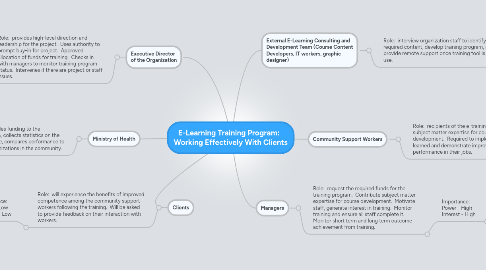
1. Executive Director of the Organization
1.1. Role: provides high-level direction and leadership for the project. Uses authority to prompt buy-in for project. Approved allocation of funds for training. Checks in with managers to monitor training program status. Intervenes if there are project or staff issues.
1.1.1. Importance: Power - Medium Interest - Medium
1.1.1.1. Readiness: not directly involved in training project, but sees the potential benefit, and supports the endeavour, willing to provide time and resources to assist where necessary.
2. Ministry of Health
2.1. Role: provides funding to the organization, collects statistics on the performance, compares performance to similar organizations in the community.
2.1.1. Importance: Power - Low Interest - Low
2.1.1.1. Readiness: not directly involved with the training program. However, they will assess long term organization performance, so improved performance will help to secure future funding.
3. Clients
3.1. Role: will experience the benefits of improved competence among the community support workers following the training. Will be asked to provide feedback on their interaction with workers.
3.1.1. Importance: Power - Low Interest - Low
3.1.1.1. Readiness: clients unaware of staff training, but long term client satisfaction will be one of the factors used to measure program success.
4. External E-Learning Consulting and Development Team (Course Content Developers, IT workers, graphic designer)
4.1. Role: interview organization staff to identify required content, develop training program, and provide remote support once training tool is in use.
4.1.1. Importance: Power - High Interest - High
4.1.1.1. Readiness: Vested interest in program success for both the organization’s benefit and their own reputation. Well-prepared, committed to project, have all required skills and competencies.
5. Community Support Workers
5.1. Role: recipients of the e-training. Contribute subject matter expertise for course development. Required to implement skills learned and demonstrate improved performance in their jobs.
5.1.1. Importance: Power - Medium Interest - Low to High
5.1.1.1. Readiness: staff are pleased at the flexibility that online training provides in terms of time and location. As a result, they are enthusiastic about the training.
6. Managers
6.1. Role: request the required funds for the training program. Contribute subject matter expertise for course development. Motivate staff, generate interest in training. Monitor training and ensure all staff complete it. Monitor short term and long term outcome achievement from training.
6.1.1. Importance: Power - High Interest - High
6.1.1.1. Readiness: believe there is a need for the training. Eager to see it implemented successfully and willing to do whatever is necessary to support and motivate end users.
